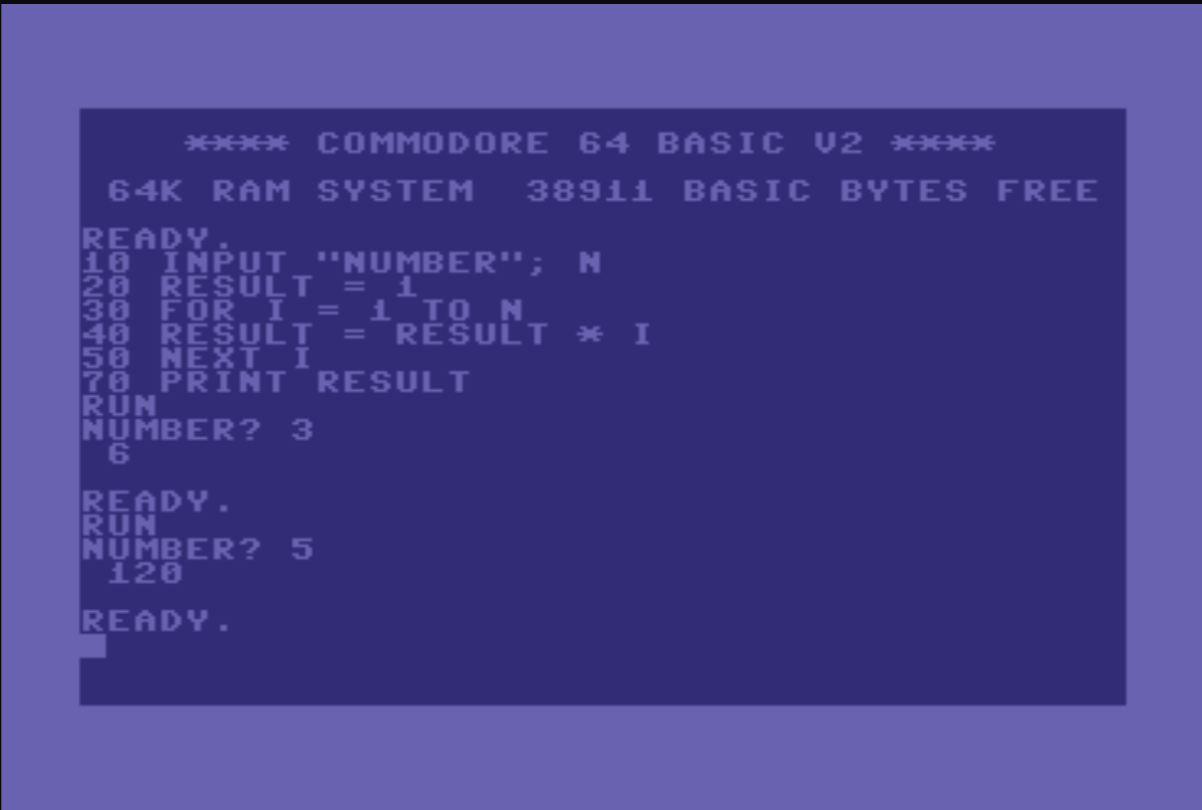Interview question - calculating a factorial
When I was a tech writer, almost every time a developer interviewed me, they would inevitably ask me to whiteboard how to calculate the factorial of a number. When I moved to Northern California in 2008 and started interviewing at various Bay Area tech firms, I was seriously asked to do this exact problem at least twelve times in interviews with three companies.
I thought of this recently after reading this, and thinking of the smart-aleck answers I never did give during interviews, like writing it in PostScript or COBOL.
(BTW, a factorial is the product of all positive integers between 1 and n. It’s denoted as n! So 4! = 1 * 2 * 3 * 4 = 24.)
Iteratively
The simple/obvious answer is doing it iteratively. In C:
int factorial(int n)
{
int i;
int result=1;
for (i=1; i<=n; i++){
result = result * i;
}
return result;
}
Extra credit:
- That should fail if you called it with a zero or a negative number.
- There isn’t a
main()that asks for a number and prints the result in a pretty way. - If you want to be cute, use the assignment operator
result *= iinstead ofresult = result * iand save nine keystrokes.
Recursively
They won’t always expect this from a writer who doesn’t regularly code, but here’s the other way to do it:
int factorial(int n)
{
if (n == 0)
return 1;
return n * factorial(n - 1);
}
You can make this way more incomprehensible with the ternary operator:
int factorial(int n)
{
return(n==1||n==0) ? 1 : n*(factorial(n-1));
}
…Other
Scheme
I went to Indiana University at a time when the first three or four computer science classes were all taught in Scheme. I always wanted to whiteboard this as an answer:
(define (factorial n)
(cond ((equal? n 0) 1)
(else (* n (factorial (- n 1))))))
Extra credit: do it with tail recursion.
Liquid
This blog is in Jekyll, so maybe you’ve worked with Liquid templates before:
{% assign n = 20 %}
{% assign result = 1 %}
{% for i in (1..n) %}
{% assign result = result | times i %}
{% endfor %}
{{ result }}
(Tip: if you have to put a Liquid template in a code block in Jekyll, look at the source of this page in GitHub. I’d explain, but delimiting the text in another example isn’t working.)
REST API
APIs are the future (not speaking for my employer, of course) so maybe you want to use a REST API to do it:
curl http://api.mathjs.org/v4/?expr=5!
(Why use cURL though? There’s a much better way.)
Standard libraries
If they forget to qualify their question with “don’t use standard libraries” you can do this (Python):
import math
def factorial(x):
print (math.factorial(x))
Commodore BASIC 2.0
Let’s take it back to the beginning:

SQL
I was trying to figure this out, but my SQL days are long behind me. You could use a recursive common table expression to create a table of n rows with each row containing the result of the previous row multiplied by the row number… or something.
This is the point in my research where I had to give up and walk away for a bit. But if you had the right PDF CLI library, you could write a shell script that creates a one-page blank PDF, then iteratively merges copies of that template PDF onto a result PDF and count the number of pages at completion. There’s some magic number limit of objects in the PDF specification so they still work on 32-bit machines – eight million or so – which means this would break just past the factorial of 10.
Actually, a lot of these would break after about 12, when you’d hit INT_MAX. There’s a way to do bigger numbers by creating an array of the number of digits you want to calculate, then writing a multiply function that does all of the carrying when each spot in the array goes past 9, etc. If you really want to push it, use a linked list instead of an array so you won’t waste any space. This probably won’t fit on one whiteboard.
PostScript
Oh, here it is in PostScript (I don’t know PostScript anymore; I borrowed it from here…)
/factorial { 1 dict begin
/n exch def
n 0 eq {
1
}{
n n 1 sub factorial mul
} ifelse
end } def
(The serious answer to all of this, if you’re a developer tasked with interviewing a tech writer, is to ask them about their problem-solving methodology, and how they figure things out when they don’t know the answer. People who have to write a code sample every other month won’t know off the top of their head how to reverse a linked list. They should be able to talk you through a difficult problem they had to solve once, though. It’s probably a cross-functional review, right? Test their soft skills, not their ability to memorize. Just my opinion.)